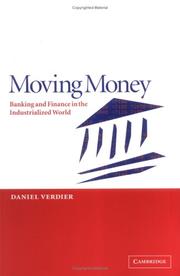| Listing 1 - 1 of 1 |
Sort by
|

ISBN: 0521891124 0521814138 0511178891 0511042477 0511148860 0511306059 0511491883 1280434104 0511045603 1107133637 9780511042478 9780511491887 9780511045608 9781280434105 9780511148866 9780521814133 9780521891127 Year: 2002 Publisher: Cambridge Cambridge University Press
Abstract | Keywords | Export | Availability | Bookmark
 Loading...
Loading...Choose an application
- Reference Manager
- EndNote
- RefWorks (Direct export to RefWorks)
Moving Money analyses the influence of politics on financial systems. Daniel Verdier examines how information asymmetry and economies of scale over time have created a redistributional conflict between large and small banks, financial centres and their peripheries, and he discusses how governments have attempted to arbitrate this conflict. He argues that centralized states have tended to create concentrated, internationalized, market-based and specialized financial systems, whereas decentralized states have favoured dispersed, national, bank-based and, with a few exceptions, universal systems. Verdier then sets out to uncover the sources, political and economic, of cross-country variation in financial market organization, examining 15 to 20 OECD countries from 1850 onwards.
National consumption --- Money. Monetary policy --- Banks and banking. --- Decentralization in government. --- Decentralization in government - Case studies. --- Finance. --- Banks and banking --- Finance --- Decentralization in government --- Banking --- Business & Economics --- 323.23 --- 336.71 --- AA / International- internationaal --- 333.101 --- 331.162.0 --- Politieke agitatie --- Bankwezen --- Banksysteem en bankstelsel. --- Geschiedenis van de particuliere financiën: algemeenheden. --- Social Sciences --- Political Science --- 336.71 Bankwezen --- 323.23 Politieke agitatie --- Centralization in government --- Devolution in government --- Government centralization --- Government decentralization --- Government devolution --- Funding --- Funds --- Agricultural banks --- Banking industry --- Commercial banks --- Depository institutions --- Economics --- Currency question --- Political science --- Central-local government relations --- Federal government --- Local government --- Public administration --- Financial institutions --- Money --- Geschiedenis van de particuliere financiën: algemeenheden --- Banksysteem en bankstelsel
| Listing 1 - 1 of 1 |
Sort by
|

 Search
Search Feedback
Feedback About UniCat
About UniCat  Help
Help News
News